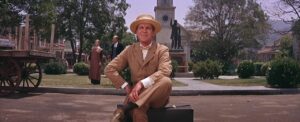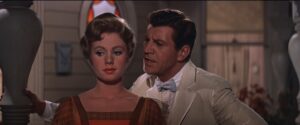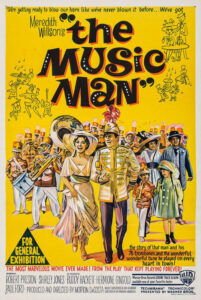by Barb Lentz.
The five movies Bob provided me from which to choose were these:
Attack (1956)
Enter the Dragon (1973)
The Music Man (1962)
Prince of the City (1981)
The Treasure of the Sierra Madre (1948)
I chose the musical because a friend of mine had recently seen that show on Broadway with Hugh Jackman and raved about it. What she said about the play made me want to see it, so that is what piqued my interest in the movie version of The Music Man.
I was surprised to learn that the story takes place when it does, in the 1910s, before World War I. Setting the story in that era, and in rural Iowa, provides it with a quaintness that is odd, yet charming. I guess I was not expecting something so old-fashioned; everyone seems to know each other, there is a barbershop quartet and a soda fountain, the most popular place in town seems to be the library and traveling salesmen are both common and plentiful. Looking back, it was a completely different way of life just over a century ago. Some things are familiar because people in my family had farms in Kansas that I remember, but this movie features things I’ve not seen before.
I had trouble with some of the early songs in the story, particularly the one on the train, in its “speak-song” style, syncopated with the rhythm of the train, and Harold Hill’s “Ya Got Trouble.” Partly because of the speed of the lyrics but more so because of the idioms used. I am not familiar with terms like “hog’s head, cask and Demi-john,” “Sen-Sen,” “Jasper,” “Dan Patch,” “Cap’n Billy’s Whiz Bang,” “Bevo” and such, so it was difficult to appreciate the music when I was distracted by those unfamiliar words as they flew past. I couldn’t make out the chorus of “Pick-a-Little, Talk-a-Little” either; it was just sung too quickly. On the other hand, I liked that some of the song lyrics referenced literature that one might not expect to see in rural Iowa: Shakespeare, Balzac, “The Scarlet Letter,” etc. Overall, the songs were very inventive and catchy, especially later in the story.
The story itself surprised me as well; I was not expecting a musical centered on a con man. Harold Hill (Robert Preston) is introduced as a salesman who “doesn’t know the territory,” stopping in River City, Iowa, basically on a dare, to sell the town on the idea of a boy’s band complete with uniforms (the real money-maker), planning to skip town with the cash. But Hill’s preference for “the sadder but wiser girl” is tested and beaten by the beautiful Marian the Librarian (Shirley Jones), who sees through his pretense with knowing eyes. Hill finds himself drawn to Marian and to her much younger brother Winthrop (Ronny Howard), a boy who has withdrawn and started to lisp since their father’s death two years previously. Hill has one friend in River City, rascally Marcellus (Buddy Hackett), a former salesman who has comfortably settled in River City, and Marcellus essentially runs interference for his friend while his con unfolds.
But Harold Hill is a con man with a heart, and when it comes to escape he just cannot do it. The band, in their new yet cheap-looking uniforms, assembles and Hill reluctantly conducts it in his revolutionary “think” method, hoping that the result sounds something like Beethoven’s Minuet in G. It shouldn’t, but somehow it does, and the scene transforms into the grand “Seventy-Six Trombones” finale, complete with elegant finery and pitch-perfect playing. All ends well in River City.
My top five moments of the movie are:

1. The songs and choreography. Musicals live and die by the quality of their songs, and Meredith Willson composed some gems for this show. My favorites were “Marian the Librarian,” “Till There Was You” and “Seventy-Six Trombones.” Even the unfortunately-titled “Shipoopi” is catchy and fun. And Oona White’s choreography is excellent; she later won an Oscar for her work on “Oliver!.”
2. The barbershop quartet was excellent. It was neat how the script brought together four city politicians who couldn’t agree on anything and suddenly blended them into a skilled quartet who sang together beautifully. They are performed by the Buffalo Bills, an award-winning group of the era, and they are terrific.
3. Ronny Howard. It was fun to see Ronny Howard so young, trying so hard to lisp properly. He transforms from sullen boy to outgoing kid as soon as he gets a trumpet to play, and it is his metamorphosis that most affects Professor Hill’s conscience.
4. The power of the women. Even though the story is undoubtedly sexist (it is about a boy’s band, after all), it is the story’s women who keep everything running and fix all of the problems. They stand up to the men and make those men bend to their will; the prime example is the mayor (Paul Ford) and his wife (Hermione Gingold). And of course it is Marian’s love that finally gives Harold Hill some backbone.
5. The redemptive power of music. Winthrop comes out of his shell because of music — playing the trumpet and singing “Gary, Indiana,” his new favorite song. Marian lives for books but it is song in which she expresses her true feelings and in “Till There Was You” she finally comes truly alive. Hill rescues troublesome teen Tommy (Timmy Everett), puts him together with the Mayor’s daughter (Susan Luckey) and gives him purpose leading the band. And of course the whole town comes alive in the finale, when everybody celebrates the new band while marching through the streets to the strains of “Seventy-Six Trombones.” Music cures all in River City.

I didn’t like everything about this movie. I don’t understand why the “Lida Rose / Will I Ever Tell You” song was filmed the way it was, spotlighted in different areas of the screen. I wasn’t sure who Amaryllis was for a long time, and I found it hard to believe that Winthrop and Marian were brother and sister. But those are minor flaws, and the film overcomes those issues with energy and wit. Robert Preston, repeating his Tony-winning Broadway role, is engaging and glib; he was absolutely the right casting choice. Shirley Jones is good, appropriately uptight as Marian. Notice how her clothes become more feminine and inviting as she opens her heart to Harold Hill. Even the sets are good; I recognized the town square from “Gilmore Girls,” my favorite television show.
Like a great many musicals that ignore realism in favor of creating their own vision of the world, The Music Man is impossible to accept as a realistic, convincing story. But that’s okay. The music and choreography transport viewers to another place, maybe a better place, where romance can blossom, music can heal, outcasts can find acceptance and everything turns out swell in the end.
Is The Music Man a classic? I think so. A musical needs classic musical numbers and this one has at least four. It is memorable in many ways, well-performed and very witty. Furthermore, it is adept in its depiction of human nature and behavior. It is also optimistic, believing that even a reprobate like Harold Hill can find love and redemption in a place like River City. It is certainly old-fashioned and quaint, but it is also vibrant and joyful. It makes me want to see the stage version, although I can still hardly believe that this show beat West Side Story to a Tony award as Best Musical in 1957. In any case, it makes for a pretty good movie, probably a classic.
BRL 30 December 2022.
The Music Man (June 19, 1962) Warner Bros. Pictures
Produced and Directed by Morton DaCosta.
Written by Marion Hargrove.
Based on the play by Meredith Willson and Franklin Lacey.
Principal Cast (character, performer):
Professor Harold Hill Robert Preston
Marian Paroo Shirley Jones
Marcellus Washburn Buddy Hackett
Eulalie Mackechnie Shinn Hermione Gingold
Mayor George Shinn Paul Ford
Mrs. Paroo Pert Kelton
Winthrop Paroo Ronny Howard
School Board The Buffalo Bills
Timmy Everett Tommy Djilas
Zaneeta Shinn Susan Luckey
Charlie Cowell Harry Hickox
Amaryllis Monique Vermont
151 minutes. Color. Widescreen (2.35:1). Rated G.

